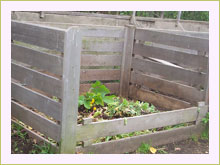Basic composting through the winter
Burpee Edible Gardening Team Members

Tasty vegetables come from healthy, happy plants. And happy plants are well-fed plants! The best way to offer a nutritious boost to your garden is to amend your soil with compost and other organic matter. Compost is a quick fix to clay or compacted dirt, and helps plants take root, too.
If you haven’t designated a space in your garden for composting, we encourage you to do so. It’s not called “black gold” for nothing! Not only does it help your garden grow, it’s a great way to recycle kitchen waste and put you on an even greener path to gardening.
To start small this winter, compost bins of all sizes and styles are available at garden centers and online stores. But you can build your own bins just as easily. And if you’re short on space, the “cold compost” method lets you break down matter in a small container or garbage can.
You’ll need a mix of “dry browns” (leaves, dry grass, newspaper, hay, and plant clippings) and “wet greens” (veg and fruit scraps, coffee grounds, tea bags, fresh leaves). You Grow Girl writer Gayla Trail advises you to layer your browns (6 inches) and greens (2-4 inches) and sprinkle with water: damp, but not soaked. Then cover with a layer of dirt or close your container. Aerate your bin every few days or weeks to get the air flowing.
The breakdown process begins, and compost is on its way with a little patience. You’ll know it’s ready when the pile is a rich black color with an “earthy” smell. Continue to add kitchen scraps to your bin, but be sure to bury them. If they’re left on the top, they’ll miss the decomp process.
Remember: Don’t add oil, meat, bones or fatty-scraps to your compost. These will attract the wrong kind of attention (hello, rats!) and the smell can get rank pretty fast. But do encourage worms, slugs and other creepies into your pile. They’re essential to healthy compost.
The winter cold may slow the process, so for best results, place the compost bin where it will get the most sun. Come springtime, you should have wonderful “black gold” to work into your garden and feed your plants!